“Brother Storm” lends a helping hand
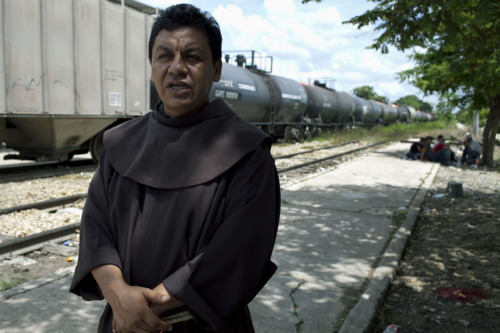
Father Tomas Gonzales, otherwise known as “Brother Storm”, runs a hostel for migrants chasing the American Dream. (Photo: Carlos Villalón)
TENOSIQUE, Mexico — He alternates between an old Nike t-shirt and his dull brown monk’s habit. Rain or shine he goes everywhere in a pair of beaten-up leather sandals.
To the Church he is Father Tomas Gonzalez, a member of the Franciscan Order. To human rights activists and the hundreds of undocumented migrants he helps he is known simply as “Brother Storm”.
“Fray Tormenta” (Brother Storm) was the ring name of a Mexican priest turned masked wrestler in the 1970s.
But Gonzalez’s nickname, according to his supporters, is testimony to his stormy confrontations with corrupt government officials and criminal gangs who blackmail, rob, rape, and even kill dirt-poor undocumented migrants en route to the United States.
“Migrants represent a lot of money, whether its for the store-owner along the railroad tracks, corrupt authorities and immigration officials, or organized crime,” Brother Storm told Univision during a recent visit to the migrant hostel he runs in the southern Mexican border town of Tenosique.
“Helping migrants is like trying to take that ‘merchandise’ away from them and it can be dangerous,” he added.
Gonzalez’s hostel is still very much a work in progress. Inaugurated earlier this year, he named it “The 72” in memory of the 72 mostly Central American migrants murdered by suspected members of the Zeta drug mob in San Fernando, Mexico in August 2010.
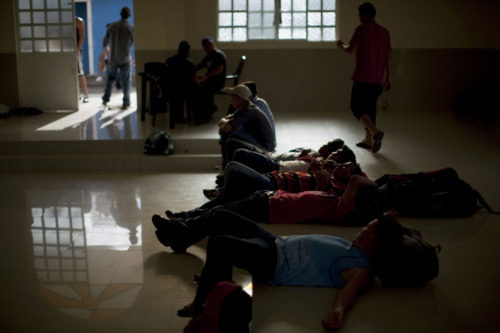
Brother Storm’s hostel provides a much needed safe haven and respite from the arduous journey north for hundreds of Central American migrants. (Photo: Carlos Villalón)
According to computer records kept by Gonzalez and a small staff of volunteers and human rights workers, around 500 migrants - men, women, and children - stay at the hostel every month.
“These migrants are making huge sacrifices. They have to leave because they don’t have a decent life in their own countries,” he explained.
“But on their route to the United States they face assaults, robbery, and rape whether they’re men or women. Mexico is very often the tomb of Central American migrants,” he said.
Migrants limp into the hostel at all hours of the day. They arrive after hiking for at least a full day and night along a 64-kilometer route that skirts around official checkpoints along the Guatemala-Mexico border.
For most, it’s the toughest phase so far on their journey north. After crossing jungle-clad mountains and snake and lizard infested swamps, most have practically destroyed their shoes and have heavily blistered feet.
“You’ve got to know how to face the risks, otherwise you’re just going to be one more victim on the road north,” William Martinez, a Honduran migrant in his early 20s told me.
Brother Storm’s hostel is just two blocks away from the railway tracks that carve through Tenosique. Every two or three days a cargo train lumbers along the line headed northward.
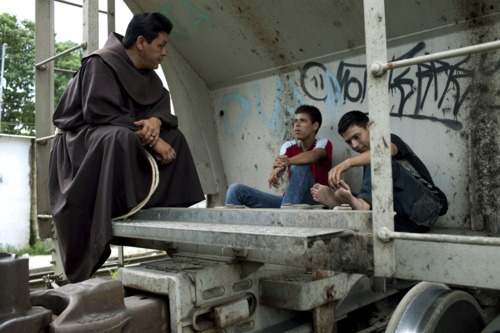
Brother Thomas’ hospitality and blessings are one of the very few bright spots for the migrants travelling on “The Beast”. (Photo: Carlos Villalón)
Migrants have nicknamed the locomotive “The Beast”. It has no fixed day or time of departure.
While they wait, the hostel offers a dry place to sleep in the form of a shack under a tin roof. Early arrivals get a mattress on the ground, and they take a rudimentary shower by stripping off behind a curtain of plastic sheeting and dousing themselves with water poured from a family-sized Coca-cola bottle.
“It’s admirable what he’s doing,” one migrant at the hostel told me. “Normally people just treat us like animals. If it wasn’t for the Father we’d be out on the streets or down by the tracks risking our lives.”
The hostel is partially funded by the Catholic diocese, and twice a day, the “Betas”, members of one department of Mexico’s National Immigration Institute (INM), swing by bringing the migrants warm food.
Paradoxically, their colleagues from other departments of the immigration service are combing the mountains and highways looking to capture undocumented migrants and deport them.
Brother Storm is highly critical of the INM, describing the government agency as “totally rotten” and accusing its officials of extorting poor migrants in return for not deporting them. He makes similar criticisms of all of Mexico’s police units and the military.
Such accusations have been supported by the Mexican government’s own National Human Rights Commission (CNDH).
He has been equally vociferous in his criticism of the drug cartels which have created a lucrative side-business kidnapping migrants and demanding ransoms of several thousands dollars each from relatives already working in the United States.
One night in July this year, two truckloads of masked gunmen pulled up outside the hostel and threatened to break in. Scores of terrified migrants fled over the walls.
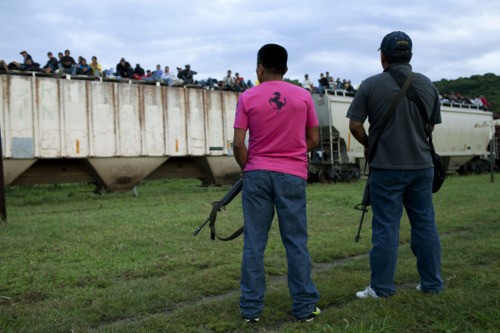
As if making the perilous journey atop “The Beast” weren’t enough, migrants also need police protection to ensure that they don’t fall victim to the hitmen and kidnappers that populate the train’s route. (Photo: Carlos Villalón)
It was not clear if the men were cartel hitmen trying to take reprisals against Brother Storm for his public criticisms, or a gang trying to carry out a mass abduction.
Each day, Brother Storm and the volunteers give migrants what they call “mini-seminars,” a quick chat about the dangers facing them on their path to the American Dream. He will offer them a blessing when asked, but never gives them Catholic Mass.
“I don’t like going to Mass myself even. I prefer to be out on the streets trying to help in some practical way,” he said.
Gonzalez, 38, is from Mexico City and says he was influenced during his years of study in the seminary by “liberation theology”, a leftist movement that gained popularity within parts of the Catholic Church during the 1960s.
Described by critics as Marxist-Christianity, proponents of liberation theology say it’s a way of putting Christian teachings into practice by helping the poor overcome unjust social and economic conditions.
In the mid-1980s Pope John Paul II, on the advice of then-Cardinal Ratzinger (now Pope Benedict XVI), tried to purge the Church of liberation theologians, or rebel priests.
That’s likely the reason Gonzalez stops short of openly describing himself as a liberation theologian.
Yet Brother Storm makes no secret of his anger and frustration with what he sees as an unjust economic system that forces poor Central Americans and Mexicans to risk their lives to cross illegally into the United States in search of an income.
“This is a world economic system that expels and vomits out poor men and women of all ages. The American Dream is a goddamned nightmare,” he told me.
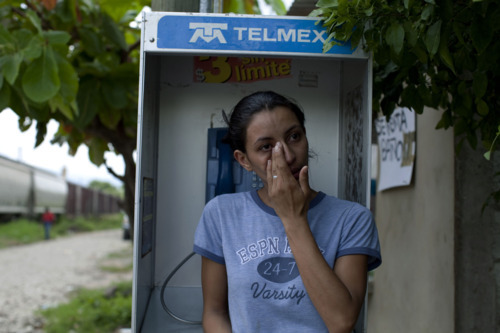
Many of the migrants leave their families behind when they embark on the journey north not knowing if they will see or hear from them ever again. (Photo: Carlos Villalón)
Talking to the migrants, it’s easy to see his point.
“I wanted to study but my father didn’t have enough money to enroll me at university so I left. The only chance I have in Honduras is surviving and being just another poor person,” said 19-year-old Honduran Walter Faly.
His traveling companion, 21-year-old Selvin Caballero agreed.
“You work a lot in Honduras but never seem to achieve anything. You just get by. Now I want to get to the United States. I’m ready to take any kind of work,” he said.
Some U.S. and Mexican government agencies have reported that undocumented migration may be slowing due to fewer job opportunities as a result of the economic downturn in the United States. But Brother Storm says he has not noticed a drop in the numbers of migrants looking for a bed and a square meal at his hostel.
He’s skeptical that Mexican politicians will act any time soon to ease the plight of undocumented migrants moving north from Central America toward the U.S. border. Initiatives such as granting migrants a temporary visa to legally transit through Mexico have been mooted but seem unlikely to be enacted.
Brother Storm is even more doubtful the 2012 U.S. presidential elections will produce a solution.
“Every politician uses the issue of migrants for their own political and electoral goals,” he said. “But none of them have the true political will to find a solution for the dangers migrants face.”
No comments:
Post a Comment